June 26, 2025 | 02:26 GMT +7
June 26, 2025 | 02:26 GMT +7
Hotline: 0913.378.918
June 26, 2025 | 02:26 GMT +7
Hotline: 0913.378.918
Editor's note:
On the occasion of the 30th anniversary of the establishment and development of the Department of Quality, Processing, and Market Development (Ministry of Agriculture and Rural Development), Vietnam Agriculture Newspaper is honored to introduce a series of articles by former Minister of Fisheries Ta Quang Ngoc about a starting period with new thinking that creates a solid foundation and contributes to bringing Vietnamese agricultural products to more than 180 countries and territories as of today.
I did not expect that the knowledge I learned at that time would be so useful to me when I exposed to the book Fresh Fish: Changes in Fish After Death, compiled by Hans H. Huss (1).
This brochure is published by FAO, used as the main textbook, and used by the author himself to teach us about the necessity to firmly grasp and apply HACCP in fisheries at the regional training class (Asia-Pacific) on seafood inspection and quality safety that was held in Kochi, India, on November 5–16, 1990. What a great fate!
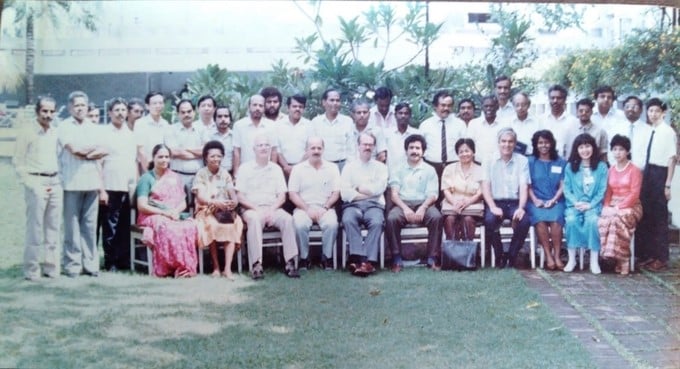
The photo was taken at the closing ceremony of the class in Kochi, India, on November 16, 1990. The author is positioned in the standing row, 6th from left. Documentary photo of former Minister Ta Quang Ngoc.
I still remember the sentence H. H. Huss opened the lesson: You guys remember that for the recently deceased, lay flowers; for dead fish, immediately cover with ice. I enjoyed repeating that reasonable statement to him as a greeting when I met him again at the end of October 1997 at his workplace in Copenhagen, Denmark.
Except for the host country, India, with about ten people attending the class, each remaining country could only have one representative participating. As a representative of Vietnam, my English communication at that time was still limited. Thus, FAO representative in Vietnam, Mr. Zakhariev, sent an additional sister from the FAO agency in Hanoi to accompany me. To me, this training class left a good impression on both teachers and students about the simplicity in imparting knowledge as well as in practical surveys so that students can quickly access profound but practical knowledge that is very necessary for those responsible for seafood quality.
For me, a technical officer, that knowledge opened up thinking to help change the way of doing quality products, inspection, and safety and hygiene when our country's seafood was still somewhat "quarantined" with backward areas. It is necessary to develop and implement a new quality control method to produce good-quality products, not just inspect and reject unsatisfactory products when leaving the factory.
The day the class ended, Mr. Carlos (2) met me and said that FAO and InfoFish were ready to help open such a class soon in Vietnam for domestic students. I was very excited and welcomed his suggestion, because during my studies, there was a funny time when I suggested that to him. When I returned to Hanoi, I immediately reported it to the leaders and received their approval.
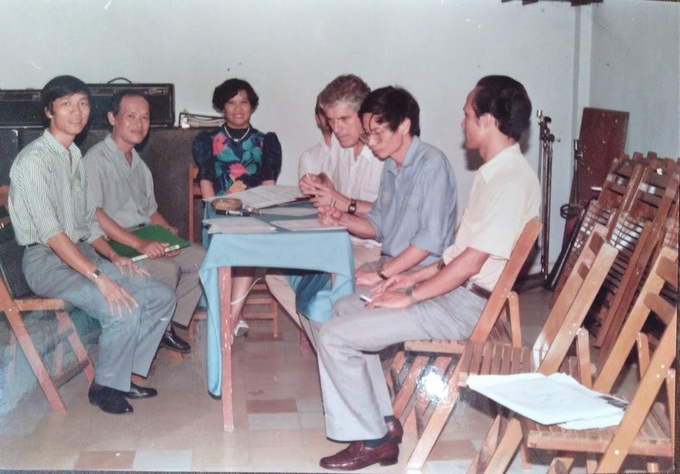
Preparing a schedule for the training class. Documentary photo of former Minister Ta Quang Ngoc.
After back-and-forth documents, the class opening was agreed upon by both sides and planned to take place at the end of May 1991 for about 10 days. Invited to attend were mainly officials working in seafood quality management at the industry and business levels, a number of technical deputy directors, and production shift leaders of export seafood processing enterprises.
Preparation for class was really urgent. This was probably one of the last training classes of this type within the framework of UNDP/FAO Project INT/90/026. SEAPRODEX helped us host the venue. KCS Center accompanied us in the stages of preparing and implementing specific classroom activities.
Lecturers and textbooks are two big things. Carlos has brought a team of compact but quality international lecturers. They were himself, Andre Goso from Italy, Sirilac from Thailand, and later, Lahsen Ababouch from Morocco (3). I had heard and liked Ababouch's presentation on seafood safety and hygiene, especially in the canning industry.
Like the class in Kochi, the textbook by H. H. Huss was taken as the main document. Therefore, a Vietnamese version of this book was needed before the class opened. Mr. Nguyen Quoc Viet, working in the Department of International Cooperation, and I shared the translation. The book's spine was removed, each person was given a number of pages, and then they were translated "speedily." We sat together or tried to look up technical words to avoid mistakes.
At that time, Mr. Viet's English was excellent, so I felt very secure. After finishing the translation, Mr. Viet did a final review. I took on the task of checking chemical formulas and areas still lacking expertise, and printing charts and images for file printing and binding.
Thanks to such urgency, the textbook was released before the class started. Up to now, I still think this is a good document, printed clearly, even though it is not beautiful. Shortly after this class, books in Vietnamese were officially published.
FAO and INFOFISH also helped bring some of our experienced experts on quality to study in classes held in other countries in the region. Also in 1991, Mr. Nguyen Tu Cuong and Mr. Le Dinh Hung attended a class in Songkhla, Thailand. Mr. Tran Quoc Son attended the class in Kuala Lumpur. After returning, they participated as lecturers for training classes that we self-organized later.
I would like to present other information about the class with a few accompanying pictures, as follows:
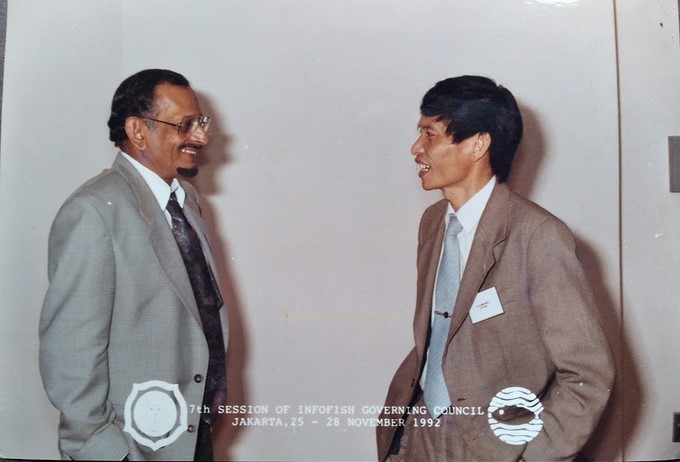
One year later, when I met Mr. Henry De Saram, Director of INFOFISH, at the INFOFISH Executive Council meeting, we still talked about the success of the training class in Vietnam. Documentary photo of former Minister Ta Quang Ngoc.
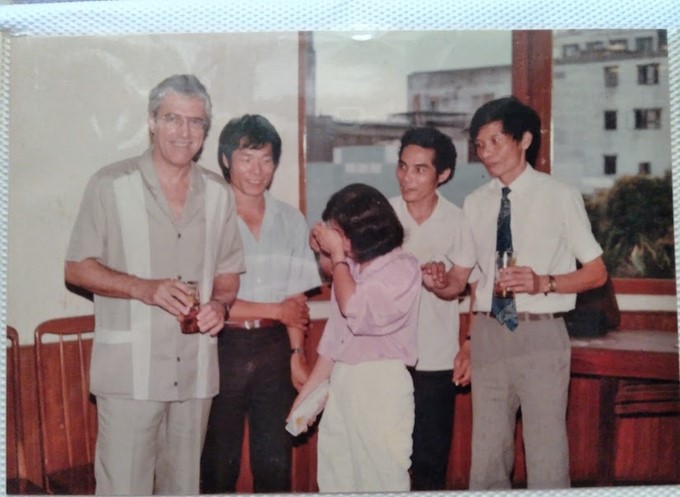
A loath farewell with Carlos, the project’s senior engineer and the conductor of HACCP classes. Documentary photo of former Minister Ta Quang Ngoc.
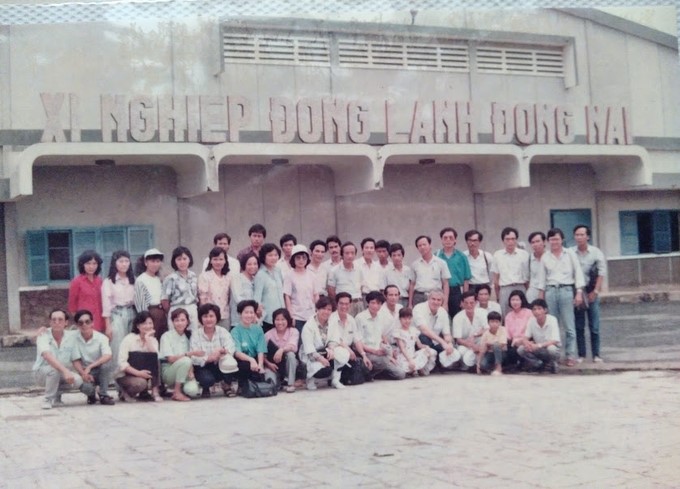
Hygiene and safety survey at Basifood. Documentary photo of former Minister Ta Quang Ngoc.
At the end of November 1991, I joined the working delegation of the Ministry of Fisheries led by Deputy Minister Vo Van Trac to visit and work with some corporations and companies in the fisheries sector in Bremerhaven, Germany.
A few days later, I took orders from Vietnam and urgently flew to Austria to attend an ongoing meeting on world fisheries organized by UNIDO at the United Nations VCC Conference Center in Vienna. I received information and documents via facsimile and telex transferred by the Department of International Cooperation and a plane ticket to Vienna sent by the Flugwagon travel agency to the hotel to fly from Bremen as soon as possible on the next day.
Arriving at Vienna airport, I went to the airport border station, presented my visa application documents (Austria had not yet joined the Schengen Agreement), went through entrance procedures, and then went straight to the meeting place. Just in time, it was my turn, the representative of Vietnam, to speak.
What I was most interested in during the remaining time were dialogues surrounding different opinions, conclusions, and recommendations of the conference and the bustling atmosphere of investment partners meeting in the halls and along the hallway (lobbying activity) around the meeting room, which seemed strange to Vietnam during the years of embargo. Now, it has been nearly 33 years, and I no longer remember those things. The world's fisheries today are very different from that time. Vietnam's position now is also very different.
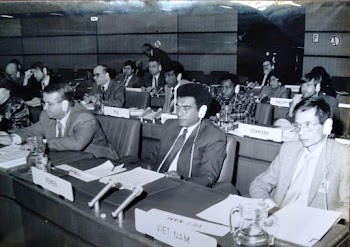
Attending the World Fisheries meeting organized by UNIDO in Vienna, Austria, in 1991. Documentary photo of former Minister Ta Quang Ngoc.
However, when skimming through the documents provided at the conference, I paid attention to the full copies of the following two European documents and regulations:
Council Directive 91/492/EEC, dated July 15, 1991, regulates hygienic conditions for the production and bringing to market of live bivalve molluscs.
Council Directive 91/493/EEC, dated July 22, 1991, regulates hygienic conditions for the production and bringing to market of aquatic products.
In a certain sense, these two documents can be considered a kind of EC's White Book on Seafood Safety and Hygiene. They were really useful to those who managed the quality and hygiene of our country's seafood right from the beginning and during the remainder of the 1990s, helping to find solutions to improve production conditions for Vietnamese aquatic products to have a strong foothold in the European market. And more importantly, our country's fisheries will be fluent in hygiene and safety based on HACCP.
(1) Prof. Hans Henrik Huss works at the Technological Laboratory of the Danish Ministry of Fisheries and Lyngby Technical University of Denmark.
(2) C. A. M. Lima Dos Santos is a training expert on the quality safety of the UNDP/FAO Project, working at the Department of Fisheries, FAO agency of the United Nations. He is a Brazilian.
(3) Lahsen Ababouch works at the Hassan II Institute of Agronomy and Veterinary Medicine, Morocco. He is an expert in canning technology.
Translated by Thu Huyen
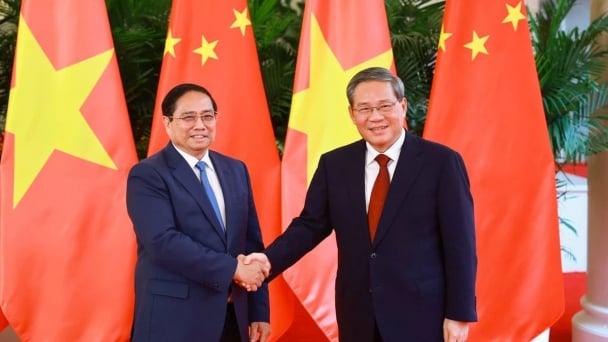
(VAN) Prime Minister Pham Minh Chinh held talks with Chinese Premier Li Qiang on June 24, in Tianjin, China.
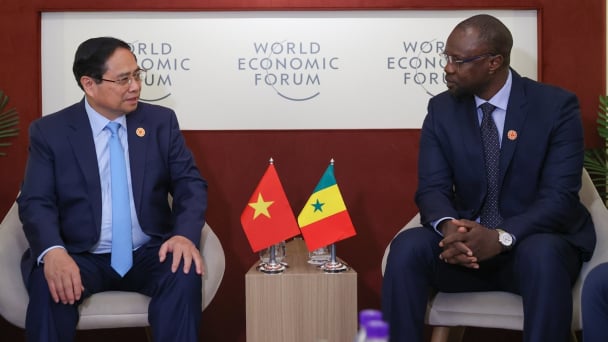
(VAN) On the occasion of attending the World Economic Forum (WEF) in Tianjin, China, on the morning of June 25 (local time), Prime Minister Pham Minh Chinh met with Senegalese Prime Minister Ousmane Sonko.

(VAN) The Net Zero door is opening, but no one can walk through it if they stay outside the mandatory emissions inventory roadmap starting in 2025.
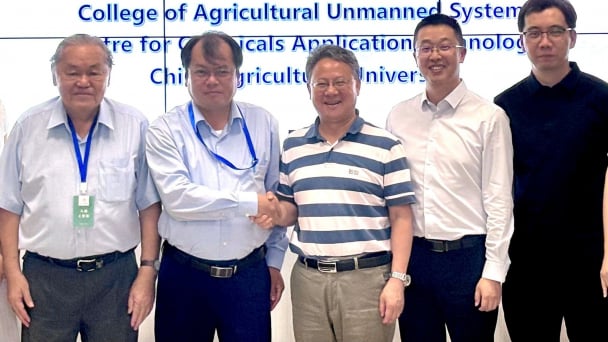
(VAN) The visit to China Agricultural University opens up new prospects for high-tech agricultural cooperation, fostering connections between research institutes and enterprises of Vietnam - China.
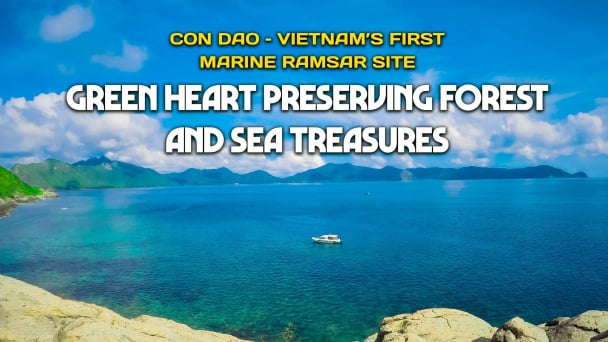
(VAN) Con Dao, the emerald gem in the vast ocean, is undergoing a powerful revival, transforming into one of Vietnam’s leading ‘eco-spiritual paradises.’ In this journey.
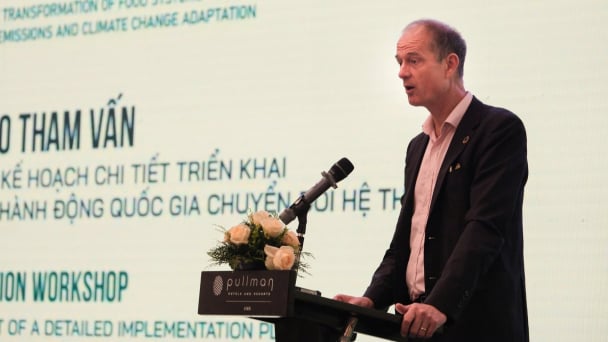
(VAN) UNDP in Vietnam organized a consultative workshop to discuss ways to integrate detailed implementation plans into the national food systems transformation strategy.
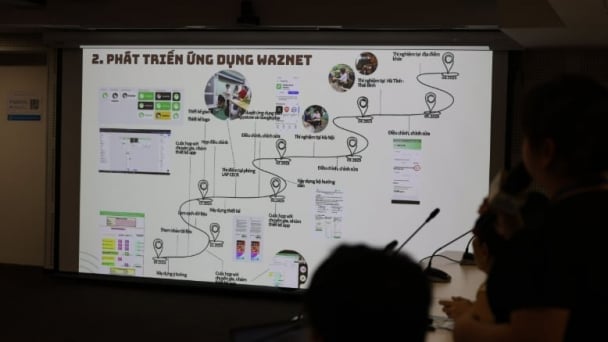
(VAN) Waznet helps digitize waste collection data, recognizing the environmental contributions of informal collectors in reducing greenhouse gas emissions.